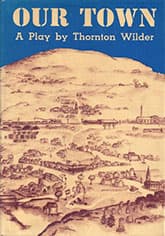Our Town
Critique • Quotes • At the movies
 First edition
First editionFirst performance
1938, Princeton, New Jersey
Literature form
Play
Genres
Tragedy, meta-theatre
Writing language
English
Author's country
United States
Length
Three acts, approx. 18,500 words
Theatre that metas
On the early covers of Thornton Wilder's play, Our Town, a small community is shown perched on the side of a lofty hill or mountain, giving the illustration a kind of aspirational feeling.
What isn't immediately clear though is that the bare hill above the community is where the graveyard is located—the cemetery that in the last part of the play is depicted as the inevitable destination of all the townspeople. Every spirit comes at last to a kind of hazy limbo in the afterlife where the ups and downs of daily life are forgotten.
That Wilder's drama is so downbeat may come as a surprise to those who know it mainly as a piece of Americana, nostalgic for a kind of small town life that disappeared sometime in the early twentieth century. This view may be aided by the first film adaptation of the play that emphasized sentimentality, and even switched the death of a main character at the end to a recovery of life.
Not that Wilder's take on the small town world is entirely dark—or entirely bright—to begin with. There is a fair bit of good-natured dialogue and sweet-tempered support among the families of the fictional Grover's Corners, New Hampshire in 1901, alongside some bitter notes that bring up the reader short, such as near the beginning when the narrator concludes a scene depicting a local boy delivering papers and chatting up the town doctor with the matter-of-fact news that the boy was aiming to become an engineer, "But the war broke out and he died in France.—All that education for nothing."
Romantic ideals and the death of dreams are similarly commingled in the lives of all the good folk. Like the case of the alcoholic choir master who is the subject of gossip by his matronly singers as being haunted by an unspecified tragedy and who ends up, without the mystery of his life having been solved, a suicide.
The biggest tragedy, however, as discussed by the despairing dead near the end, is that the living never really appreciate each other or the small joys of life while they have a chance.
Breaking the rules
What probably strikes the reader or viewer most from the beginning is the play's self-awareness of itself as theatre. The narrator of Our Town is purported to be the play's Stage Manager. He actually introduces the play with:
This play is called "Our Town." It was written by Thornton Wilder; produced and directed by.... In it you will see Miss C....
And blanks are left where the "Stage Manager" of the day can insert the real names of the principals in this theatrical production .
The so-called Stage Manager is a continual presence throughout the play, laying out scenes, giving some historical background and sometimes telling us how the characters end up years later. He also jumps into the drama to play various small roles.
It's all very "meta", as they say, and it might win intellectual plaudits as being an early work of post-modernism if it did not tell such an absorbing story with a clear point to it
When he took up Our Town, ;Wilder apparently meant to break certain rules of playwriting and theatre that he thought were stagnating. He broke the so-called fourth wall by having players addressing the audience at times, a radical concept then, and eliminated sets and props to require the actors to mime their actions with the willing participation of the audience.
Our Town deservedly won a Pulitzer Prize and has been produced more than a dozen times on stage, film and television, not to mention countless small theatre and school productions in North America. It's actually become a permanent bit of mainstream American culture.
— Eric
Critique • Quotes • At the movies

